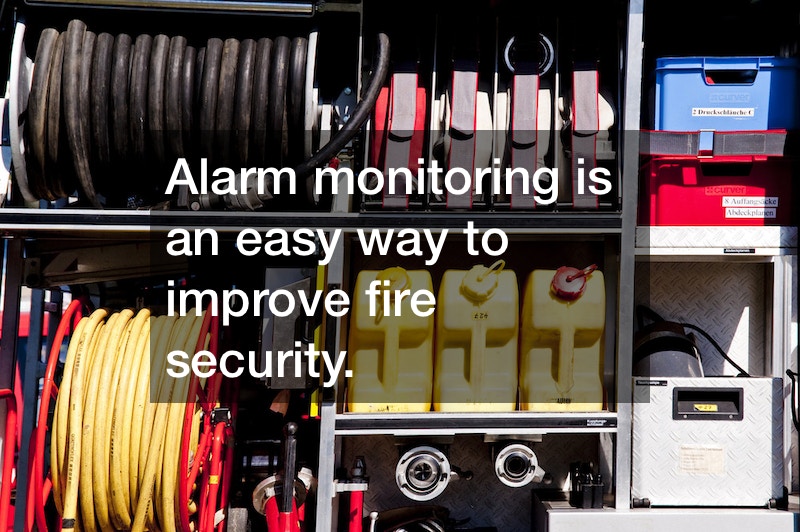When To Get Commercial Fire Alarms Inspected


Alarm monitoring is an easy way to improve fire security. Fire is devastating. A fire can cause injuries, fatalities, and structural fires are associated with millions of dollars in damage yearly. A reliable fire alarm system can save lives and reduce the risk of severe injuries from a fire.
Fire safety should be a priority for everyone, especially for commercial building owners where many gather. A level 1 alarm certification is essential for any technician working on your fire alarm system. They understand what the fire whistle codes mean and how to interpret them.
Every commercial building should be outfitted with a low voltage smoke detector on every floor, hallway, and office area. There are things that every commercial building owner can do to improve fire safety and reduce the risk of serious injury for everyone in the building.
A class e fire alarm system that is monitored can ensure that the minute a fire is detected, action is taken. When it comes to fires, early detection is critical for saving lives. Other things include having a fire safety plan with an evacuation route clearly posted on each floor.
It is essential that all the fire prevention and detection equipment in the building is properly maintained. Here is what you need to know about fire alarm inspections.
A number of hazards may threaten a commercial building today. Earthquakes might shake a building and even cause it to collapse, or floods can sweep away property and cause extensive water damage to the walls and floors. Storms such as hurricanes or tornadoes might smash airborne debris against the building or remove roof tiles. But even if a building is far away from fault lines, flood areas, or tornado or hurricane-prone areas, fire is always a possibility. A fire can cause a lot of damage and threaten both property and human life, so fire alarm services are key to managing fires when they happen. Fire alarm inspection should be done regularly to ensure that the fire alarms in a commercial building are in fine working order, and fire alarm repairs may be needed, too. Fire alarm inspection might also be done on an older building that a business owner just purchased. What are some common causes for fires in commercial buildings today, and how can fire alarm inspection help minimize the damage and risk to human life?
Why Fire Happens
No one wants a fire to happen, but precautions can be taken to minimize the risk to life and property alike. To this end, many fire protection services can be found across the United States, and statistics are often kept to see what sorts of buildings are catching fire, and how often. Among all high-rise fires, buildings such as office buildings, hospitals, hotels, and motels are at the highest risk for flames breaking out. Sometimes, warehouses may catch on fire as well, and unsurprisingly, this often results in massive loss to property. The good news, however, is that warehouse fires are on the decline. Back in 1980, some 4,700 warehouse fires took place, but by 2011, that number had dropped to 1,200 or so. But what about other building types? Although smoking lit tobacco is no longer allowed in most commercial buildings, other hazards exist. One is electrical fires, which is when a frayed electric cord allows its hot inner wires to touch drapes, carpets, or papers. This can cause a fire, and hospitals often suffer from electrical fires, or flames resulting from malfunctioning electrical components. Hotels and motels often suffer from electrical fires as well, or they may catch fire if a guest chooses to smoke a lit tobacco or other smoked products. And of course, mishaps in a kitchen, such as a hotel’s kitchen, can cause a fire. What can be done about this?
Fire Alarm Inspection and Care
Often, awareness of a fire is the first line of defense. Throughout a commercial building such as a school, a hotel, or an office building, there will be wall-mounted fire alarms in place to alert occupants of a fire. These alarms are connected to smoke detectors that keep vigil for any smoke from open flames, and this sets off the alarms. These alarms will make a loud and distinctive sound throughout the building, and they should be arranged so that a person may hear them, no matter where in the building they are. No one should get trapped in a burning building because they couldn’t hear the alarm. And in the case of deaf or other hearing-impaired occupants, these alarms also have bright, flashing lights on them. A deaf individual will see the lights on these distinctive, wall-mounted alarms, and that person will immediately realize what is going on. And these alarms alert more than the building’s occupants; they will also send a signal to a local fire station, which will send a crew to fight the fire.
Fire alarm inspection is essential to make sure that all of a building’s alarms will go off if a fire is detected, and faulty alarms should be swapped out and replaced with working models. If an alarm fails to make its sound or display its light, it should be replaced at once. A building manager should have all fire alarms inspected every so often so that they meet the city or state’s fire safety codes, and this can also be done if an old building is purchased. Old buildings have maintenance needs, and this may include the fire alarm system as well.

